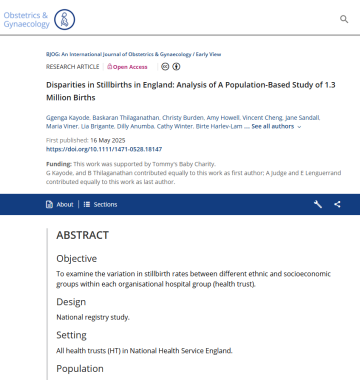Study reveals stark ethnic and social disparities in stillbirths within individual hospitals and healthcare trusts in England
- 16 May 2025
Stillbirth rates are known to be higher for Black and Asian women than for white women, and those living in the most deprived areas are more at risk than those in the least deprived areas. Now a new University of Bristol-led study involving Bristol BRC researchers, published in the Journal of Obstetrics & Gynaecology (BJOG) reveals that these disparities exist even within individual hospitals and NHS Trusts.
The study analysed data from 1.3 million births across the 130 NHS Trusts in England and is the first to report ethnic and socioeconomic disparities in stillbirth rates within those hospitals and organisations. Most recent figures show in the UK the overall rate of stillbirth is 3.4 in every 1,000 births.
Until now, there has been a lack of evidence at NHS Trust and hospital level regarding how socioeconomic disparities and maternal ethnicity affect stillbirth rates. To investigate this, the team at Tommy’s National Centre for Maternity Improvement used data from the National Maternity and Perinatal Audit data, for babies born in England between 2015 and 2017.
The findings show the risk of stillbirth varied between and within hospitals and NHS Trusts. Within some hospitals and trusts, stillbirth rates appear to be variable depending on the women’s ethnicity, with stillbirth rates lower than the national average in white women and higher than the national average in Black and Asian women.
The study confirmed a significant variation across different groups. It found that of the 1,260,567 births and 4,890 stillbirths recorded between 2015 to 2017, the stillbirth rate ranged from 2.9 per 1,000 births for women living in the least deprived areas to 4.7 per 1,000 births for those living in the most deprived areas representing a relative increase of 62%. Similarly, the stillbirth rate for Black women was double that of white women; the stillbirth rate ranged from 3.4 per 1,000 births for white women, compared to 7.1 per 1,000 births for Black women.
Dr Erik Lenguerrand, Senior Lecturer in Medical Statistics & Quantitative Epidemiologist in the Bristol Medical School: Translational Health Sciences (THS) at the University of Bristol, and Professor Basky Thilaganathan, Clinical Director of the Tommy’s National Centre for Maternity Improvement, senior and lead authors, respectively, said:
“The risk of stillbirth varies considerably from one NHS England Health Trust to another. A substantial portion of the variation in those rates can be attributed to socioeconomic and ethnic inequality. A key finding was that some Health Trusts achieving below average stillbirth rates for white women concurrently reported above average stillbirth rates for Black and Asian women. Similar findings were evident for women living in the areas with the highest and lowest socioeconomic deprivation.
“These findings indicate disparities persist even within the same healthcare settings, suggesting that factors beyond hospital-level care contribute to these inequities, emphasizing the need for systemic changes to address these inequalities to ensure equitable maternity care for all women, regardless of ethnicity or socioeconomic status.”
Kath Abrahams, Chief Executive of Tommy’s, said:
“Behind every one of these statistics are parents and families whose lives have been shattered by the stillbirth of their baby – a loss that in many cases might have been prevented.
“It is simply unacceptable that your baby is at greater risk of dying if you are of Black or Asian heritage, or if you live in an area that is more deprived than other parts of the UK. Even more shocking is that this research found significant differences in stillbirth rates for these different groups of people within some individual NHS Trusts.
“These findings underline the urgent need to tackle inequities in maternity and neonatal care and more widely across health services in the UK. Access to the best possible health care before, during and after pregnancy should be a right, not a privilege. That’s the goal we’re working towards at Tommy’s, through our research and support services: to make pregnancy and birth safe – for everyone.”
Maria Viner, Chief Executive Officer of Mothers for Mothers, a mental health charity which aims to support mothers who have experienced isolation, depression or anxiety, during pregnancy or after the birth of one or more children, said:
“We know that the families whose babies sadly die during pregnancy or birth carry that devastation forward for life. It can have an impact upon the whole family, upon future choices and future pregnancies, relationships, and mental health. Stillbirth is not only a tragedy at the time, but a tragedy for a lifetime for families.”
Dr Erik Lenguerrand, Amy Howell, Dr Christy Burden, Professor Andrew Judge and colleagues recommend the analysis is repeated when more recent data is available from the Maternity Services Dataset, so that any changes across NHS Trusts can be examined further.
The study was funded by Tommy’s baby charity, and was conducted as part of the Tommy’s National Centre for Maternity Improvement led by the Royal College of Obstetricians & Gynaecologists, and the Royal College of Midwives.
